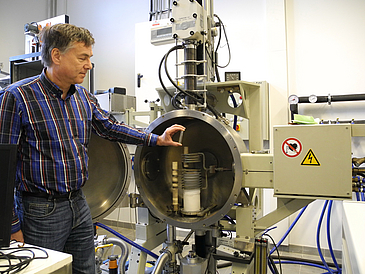The presentation of gifts between universities is certainly not an everyday occurrence. All the more significant, therefore, is a gift the University of Bremen recently received from the University of Cologne: a crystal growing facility worth half a million euros. With the aid of this facility it is possible to produce pure crystalline materials artificially. The valuable pieces of equipment include a so-called Czochralski facility and three other "Top Seeded Solution Growth" facilities. There are only about a dozen of such laboratories in the whole of Germany.
The gift was made known at the beginning of the year – but it took so long to get the facility set up and ready to go. The festive opening ceremony just recently took place. Professor Manfred Mühlberg from the University of Cologne’s Institute for Crystallography, who was instrumental in arranging the gift, held a lecture titled “Crystal Growth in Materials Science and Engineering”. Admission is free and open to everyone.
Temperatures up to almost 2,000 degrees
Professor Reinhard X. Fischer, crystallographer in the Faculty of Geosciences at the University of Bremen fills in the background: “The gift is based on the longstanding cooperation between our two universities. We have carried out a number of projects together with our colleagues in Cologne on the topic of the ion conductivity of crystals”, he explains. He initiated the transaction together with Manfred Mühlberg. Thanks to the crystal growth facility it will be possible for the first time in Bremen to produce crystals, for instance for laser optics or reference crystals for use in petrological model systems. The crystals can be drawn out of the melt at temperatures of up to around 2,000°C. The melt contains the chemical elements needed to create the new crystals. The leader of the Cologne laboratory up to now, Dr. Manfred Burianek, has been attracted to Bremen to work on the facility in the context of a project funded by the German Research Foundation.
Rubies and garnets
“In future we will be able to cultivate crystals with different individual properties. In another project supported by the German Research Foundation the focus is on the optical characteristics of crystals. At the same time in yet another project crystals are being cultivated with multiferroic properties. In this case the research focus lies on their magnetic properties”, Fischer explains. “Actually, with the new facility it would also be possible to cultivate some types of more beautiful crystals, like artificial rubies or garnets. That’s not what our research is about, though“.
More information:
University of Bremen
Faculty Geosciences
Prof.Dr. Reinhard X. Fischer
Phone: 0421 218 65160
email: rfischerprotect me ?!uni-bremenprotect me ?!.de
www.geo.uni-bremen.de/page.php?pageid=57

